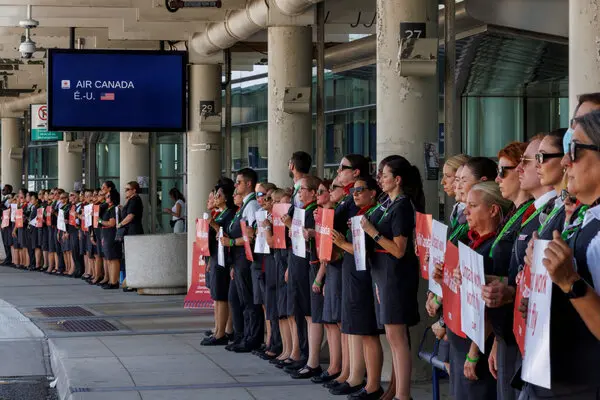Air Canada Flight Attendant Strike Disrupts Travel: What You Need to Know
By Street.co.ke Staff | August 18, 2025
Air Canada, the country’s largest airline, has been thrust into chaos as more than 10,000 flight attendants, represented by the Canadian Union of Public Employees (CUPE), went on strike starting early Saturday, August 16, 2025. The strike, the first in 40 years for Air Canada flight attendants, has grounded hundreds of flights, stranding over 100,000 travelers worldwide during the peak summer travel season. Here’s a breakdown of the ongoing labor dispute and its impact, as reported by Street.co.ke.
Why Are Air Canada Flight Attendants Striking?
The core issues driving the strike are centered around wages and unpaid work. Negotiations between Air Canada and CUPE have been ongoing for eight months, with both sides failing to reach a new collective agreement after the previous 10-year contract expired in March 2025. The union has highlighted that flight attendants are often unpaid for significant portions of their work, such as safety checks and passenger assistance before boarding and after deplaning.
CUPE has also criticized Air Canada’s proposed wage increases as insufficient. The airline’s latest offer included a 38% increase in total compensation over four years, with an 8% raise in the first year. However, the union argues this does not keep pace with inflation or match the federal minimum wage. According to CUPE, full-time junior flight attendants currently earn approximately $1,952 per month before taxes, significantly less than the $2,840 a federal minimum wage earner would make at $17.75 per hour.
“We’re the national carrier, and we have people operating in poverty. That’s disgusting, that’s very problematic,” said Wesley Lesosky, President of the Air Canada Component of CUPE, at a news conference. Natasha Stea, a flight attendant and local union president, emphasized, “We cannot work for free,” pointing out that 70% of the attendants are women and questioning whether gender dynamics play a role, especially after pilots, a male-dominated group, received significant raises last year.
Government Intervention and Union Defiance
On Saturday, August 16, 2025, just hours after the strike began, Canada’s Federal Jobs Minister Patty Hajdu intervened, invoking Section 107 of the Canada Labour Code to order the flight attendants back to work and into binding arbitration. This move, which forces a third-party mediator to decide the terms of a new contract, was meant to end the strike and resume operations. Air Canada initially planned to restart flights on Sunday evening, August 17, but the union’s defiance has complicated matters.
In a bold move, CUPE announced on Sunday that it would defy the back-to-work order, calling it “blatantly unconstitutional” and citing a conflict of interest with the Canada Industrial Relations Board (CIRB) chair, Maryse Tremblay, who previously served as legal counsel for Air Canada. The union continues to maintain picket lines at major airports in Toronto, Montreal, Vancouver, and Calgary, with other unions joining in solidarity.
Defying a CIRB order is rare and could lead to significant penalties, including fines or even criminal prosecution for union leaders. However, labor law expert Adam King noted that widespread labor movement support could pressure the government to reconsider its stance, as seen in a 2022 Ontario case where a similar back-to-work order was repealed after threats of a general strike.
Impact on Travelers
The strike has caused widespread disruption, with Air Canada canceling 671 flights by Saturday afternoon and an additional 240 flights scheduled for Sunday. The airline operates around 700 flights daily, affecting approximately 130,000 passengers each day the strike continues. Travelers like Keelin Pringnitz, stranded at London’s Heathrow Airport, and Alex Laroche, whose $8,000 European vacation is now in jeopardy, have expressed frustration over limited rebooking options and high costs for alternative flights.
Air Canada has advised passengers with canceled flights to request refunds or rebook through its website or mobile app, offering alternative travel options with other carriers when possible. However, the airline has warned that immediate rebooking may not be feasible due to the peak summer travel season, with many flights already at 85-90% capacity. Flights operated by Air Canada Express partners, Jazz and PAL, remain unaffected.
What Happens Next?
Air Canada has postponed its plan to resume flights until Monday evening, August 18, 2025, but with the union’s continued defiance, it remains unclear how operations will proceed. The airline’s Chief Operating Officer, Mark Nasr, estimated it could take up to a week to fully restore services once a resolution is reached.
The ongoing dispute raises broader questions about labor rights and government intervention. Critics argue that repeated use of back-to-work orders, as seen in previous rail and postal disputes, undermines workers’ constitutional right to strike. The union’s legal challenge against the CIRB order could set a precedent for future labor disputes in Canada.
For now, travelers are advised to check their flight status on Air Canada’s website and avoid heading to airports unless they have confirmed bookings with other airlines. Street.co.ke will continue to monitor this developing story and provide updates as the situation unfolds.
Have you been affected by the Air Canada strike? Share your story with us at Street.co.ke.

